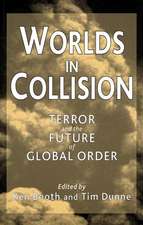State of Recovery: The Quest to Restore American Security After 9/11
Autor Dr. Barry Scott Zellenen Limba Engleză Paperback – 16 iul 2014
| Toate formatele și edițiile | Preț | Express |
|---|---|---|
| Paperback (1) | 259.25 lei 6-8 săpt. | |
| Bloomsbury Publishing – 16 iul 2014 | 259.25 lei 6-8 săpt. | |
| Hardback (1) | 951.60 lei 6-8 săpt. | |
| Bloomsbury Publishing – 13 mar 2013 | 951.60 lei 6-8 săpt. |
Preț: 259.25 lei
Preț vechi: 332.09 lei
-22% Nou
Puncte Express: 389
Preț estimativ în valută:
49.61€ • 54.05$ • 41.80£
49.61€ • 54.05$ • 41.80£
Carte tipărită la comandă
Livrare economică 23 aprilie-07 mai
Preluare comenzi: 021 569.72.76
Specificații
ISBN-13: 9781628923254
ISBN-10: 1628923253
Pagini: 272
Dimensiuni: 152 x 229 x 18 mm
Greutate: 0.45 kg
Editura: Bloomsbury Publishing
Colecția Bloomsbury Academic
Locul publicării:New York, United States
ISBN-10: 1628923253
Pagini: 272
Dimensiuni: 152 x 229 x 18 mm
Greutate: 0.45 kg
Editura: Bloomsbury Publishing
Colecția Bloomsbury Academic
Locul publicării:New York, United States
Caracteristici
Looks at how technologies and technology policies were central to the U.S. homeland security strategy.
Notă biografică
Barry Scott Zellen is a member of the board of the Arctic Research Consortium of the United States and a senior fellow of the Institute of the North, USA. He is the author of numerous books in strategic and security studies, and is founder and chief editor of the Next Innovator group of e-journals on strategy and innovation in the defense, security and information technology sectors.
Cuprins
Foreword: Innovation Leads the Way: From 'Long War' to Longer Peaceby Ambassador David T. Killion / Introduction / Part I: Technology to the Rescue / 1: Moore's Law and the Evolution of Security Technology / 2: Information Security in a World of Cyber Insecurity / 3: Document Fraud: From Criminal to Terrorist Enterprise / 4: Business Continuity in Dangerous Times / Part II. Securing our Borders / 5: Border Security and the War on Terror / 6: Counterterrorism Mentors: Allied Insights and Lessons / 7: Enhanced Border Surveillance for the Post 9/11 World / 8: Less Lethal Border Security Solutions: Midway Between 'Shout' and 'Shoot' / 9: Securing the Maritime Front: Protecting America's Seaports / 10: Securing the Southern Front / 11: Securing the Northern Front / Part III Protecting The Populace / 12 Air Rage: Aviation Insecurity After 9/11 / 13: Truck Bombing Shifts Into High Gear / 14: Underground Tremors: Securing the Metro / 15: Courtroom Violence and the War Against the U.S. Government / 16: Black Sunday Redux / 17: Special Delivery: Letter-Bombs Continue to Deliver a Lethal Message / 18: Bracing for Bioterror / 19: Nuclear Terrorism After 9/11: Rethinking the Unthinkable / Part IV: Ensuring our Survival: Thinking About the Unthinkable After 9/11 / 20: Nuclear Weapons and the War on Terror: Halting the Spread / 21: False Alarm: Saddam, WMD, And the GWOT's First Side Show / 22: Power Vacuum: Saddam's Fall and the Rise of Iran / 23: Nuclear Ambitions: Emergent Ballistic Missile Threats / 24: Securing the 'High Frontier': Missile Defense, from Hype to Hope / 25: The Axis of Evil Revisited: Reflection and Reassessment / Bibliography / Index
Recenzii
State of Recovery provides a much needed comprehensive and informed assessment of the role technology and innovation plays among U.S. adversaries in their efforts to undermine U.S. national and international security interests. Zellen further provides an insightful look into what the U.S. is doing, through its own employment of technological means, to combat or circumvent adversarial efforts. Rooted in his exhaustive and astute understanding of this complex issue, his three-dimensional look goes a long ways toward filling a significant void in this body of literature.
In our algorithmic age, Zellen focuses on the contributions that technologists working across many disciplines have made in developing a new type of security, filling the vacuum left by those attacks. As in his previous books, the level of analysis is the individual but here with an added dimension: the social networks in which individuals are embedded and lead their lives.
Zellen effectively comingles two important factors, promises of technological advances and engineering security for all Americans in the terrible and long struggle against global terrorism. That American policies and innovative technologies appear to have succeeded in preventing an attack on the homeland for more than a decade provides some comfort, but an insistence prevails that work continue. It is necessary to recognize the complexity and multiplicity of conflict that divides our world into friends as foes. This study will inform and advise us into the future.
If you have an addiction for the writings of P.W. Singer on the impact of technology on national security, or Benjamin Sutherland who writes about impact of technology on defense, society, and the economy for The Economist, you will enjoy immersing your mind with Zellen's, State of Recovery. It is a multi-disciplinary look at how technology has changed the United States, her allies and her adversaries, coupled with how the militant Islamist adversary, like al-Qaida, has adapted using technology.
In this wonderfully detailed historical mosaic, Zellen recreates the fascinating but often unsung efforts by thousands of America's technology and policy professionals who worked to restore homeland security after 9/11. Their mission - outsmart a new opponent in this epic struggle that defines our age. A must read for security and technology professionals, and for anyone recalling those darkest of days after the attacks on New York and Washington. It is a tale of overcoming fears, restoring hope and the erasure of America's collective state of despair.
In our algorithmic age, Zellen focuses on the contributions that technologists working across many disciplines have made in developing a new type of security, filling the vacuum left by those attacks. As in his previous books, the level of analysis is the individual but here with an added dimension: the social networks in which individuals are embedded and lead their lives.
Zellen effectively comingles two important factors, promises of technological advances and engineering security for all Americans in the terrible and long struggle against global terrorism. That American policies and innovative technologies appear to have succeeded in preventing an attack on the homeland for more than a decade provides some comfort, but an insistence prevails that work continue. It is necessary to recognize the complexity and multiplicity of conflict that divides our world into friends as foes. This study will inform and advise us into the future.
If you have an addiction for the writings of P.W. Singer on the impact of technology on national security, or Benjamin Sutherland who writes about impact of technology on defense, society, and the economy for The Economist, you will enjoy immersing your mind with Zellen's, State of Recovery. It is a multi-disciplinary look at how technology has changed the United States, her allies and her adversaries, coupled with how the militant Islamist adversary, like al-Qaida, has adapted using technology.
In this wonderfully detailed historical mosaic, Zellen recreates the fascinating but often unsung efforts by thousands of America's technology and policy professionals who worked to restore homeland security after 9/11. Their mission - outsmart a new opponent in this epic struggle that defines our age. A must read for security and technology professionals, and for anyone recalling those darkest of days after the attacks on New York and Washington. It is a tale of overcoming fears, restoring hope and the erasure of America's collective state of despair.











